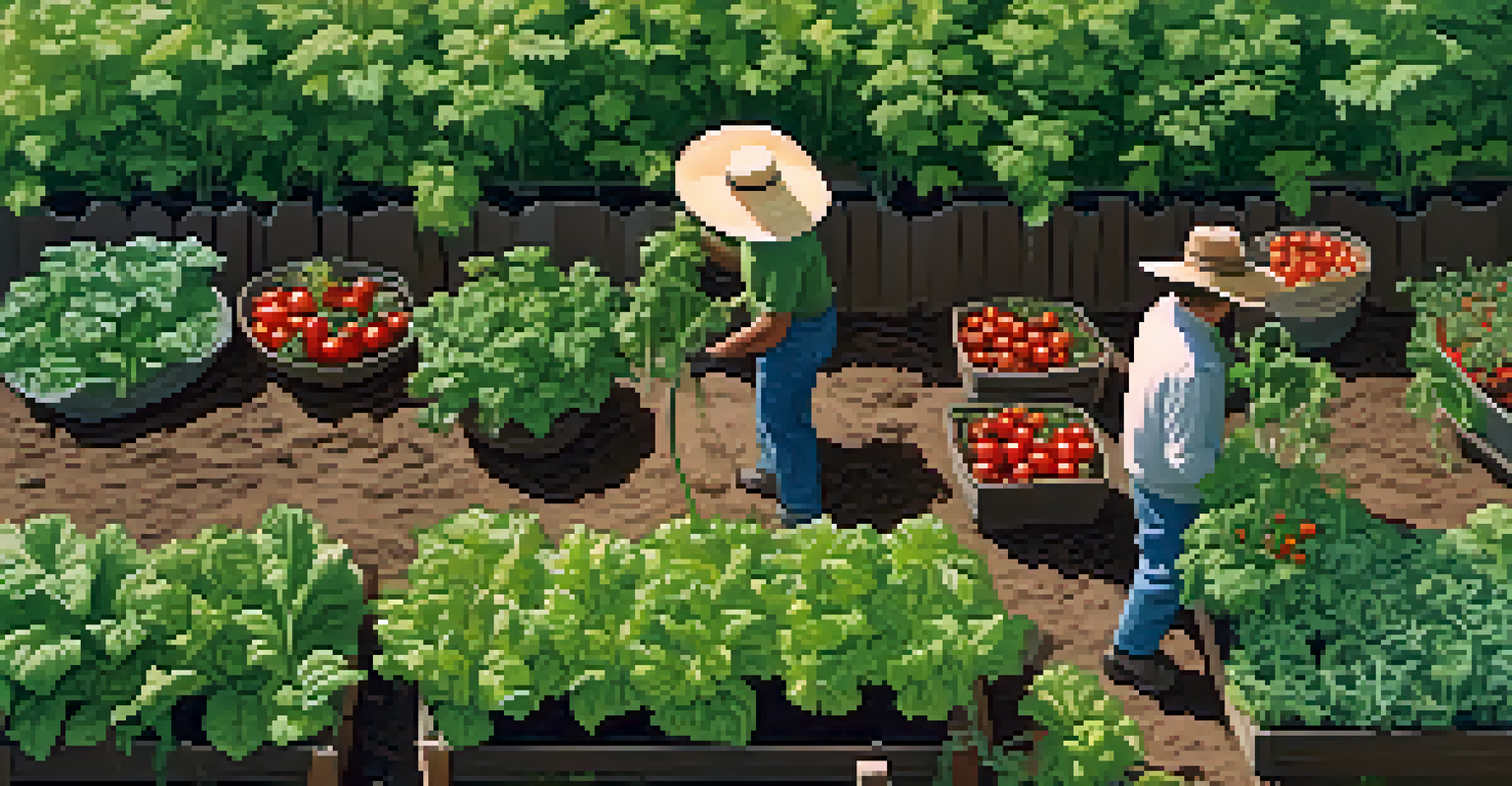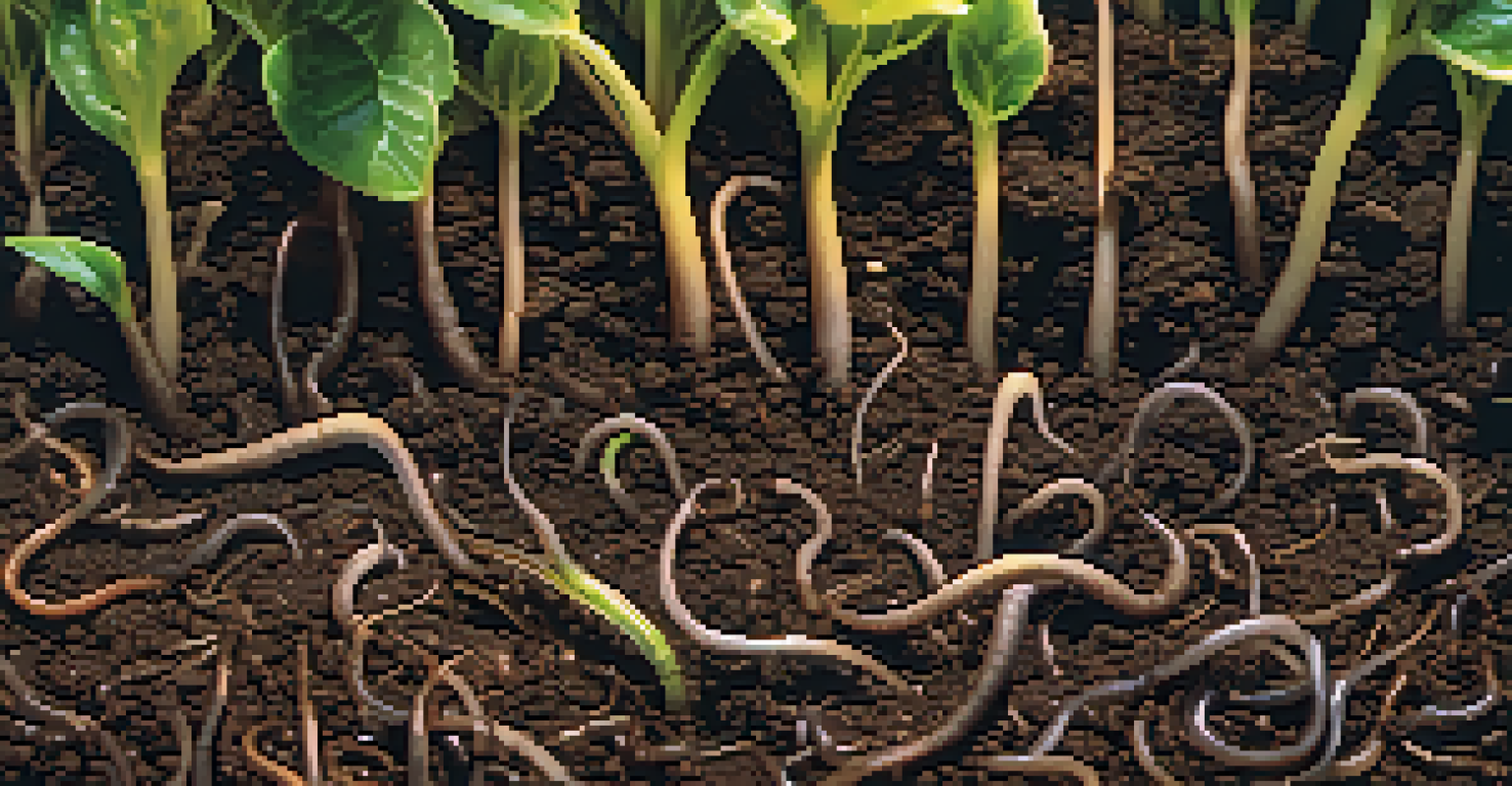Benefits of Growing Plants Without Synthetic Fertilizers

Understanding Synthetic Fertilizers and Their Impact
Synthetic fertilizers are chemical compounds used to enhance plant growth. While they can provide quick nutrient boosts, their long-term effects on soil health can be detrimental. Over time, reliance on these fertilizers can lead to nutrient imbalances and reduced soil vitality.
The love of gardening is a seed once sown that never dies.
Many gardeners and farmers have started to recognize the negative consequences of using synthetic fertilizers. These include soil degradation, water pollution from runoff, and harm to beneficial microorganisms. By understanding these impacts, we can appreciate the value of alternative methods.
The shift away from synthetic fertilizers invites us to explore natural and organic solutions that not only sustain plant health but also protect our ecosystems. This knowledge is the first step toward more sustainable gardening practices.
Enhancing Soil Health with Natural Alternatives
Growing plants without synthetic fertilizers encourages the use of natural alternatives like compost, manure, and cover crops. These organic materials provide essential nutrients while improving soil structure and fertility over time. Healthy soil teems with life, supporting a diverse ecosystem.

When you incorporate natural fertilizers, you help restore the balance of nutrients essential for plant growth. For example, compost not only adds nutrients but also improves soil aeration and water retention. This holistic approach fosters a thriving garden environment.
Natural Fertilizers Boost Soil Health
Using compost and organic materials enhances soil structure and fertility while promoting a diverse ecosystem.
Moreover, healthy soil contributes to the plant's resilience against pests and diseases, reducing the need for chemical treatments. As a result, your garden becomes a lively, self-sustaining ecosystem that supports both plants and beneficial organisms.
Promoting Biodiversity in Your Garden
Avoiding synthetic fertilizers can lead to a more biodiverse garden. When you rely on natural methods, you encourage the presence of beneficial insects, birds, and other wildlife. These creatures play vital roles in pollination and pest control, creating a balanced ecosystem.
Nature does not hurry, yet everything is accomplished.
For instance, planting a variety of flowers and herbs can attract pollinators like bees and butterflies. These species thrive in environments free from harsh chemicals, contributing to healthier and more productive gardens. This diversity not only benefits the plants but also enhances the overall beauty of your garden space.
By fostering biodiversity, you help create a resilient garden that can thrive in the face of environmental changes. This interconnectedness of life is essential for the long-term health of both your plants and the planet.
Improving Plant Resilience and Nutritional Quality
Plants grown without synthetic fertilizers often develop stronger root systems. This resilience means they can better access water and nutrients from the soil, making them less vulnerable to droughts and diseases. Healthy plants naturally withstand stressors more effectively.
Furthermore, studies have shown that plants cultivated with organic methods may have higher nutritional content. For instance, vegetables grown in nutrient-rich, organic soil often contain more vitamins and minerals. This means you’re not only nurturing your plants but also enhancing the food you consume.
Biodiversity Enhances Garden Resilience
Encouraging a variety of plants attracts beneficial wildlife, creating a balanced ecosystem that supports both plants and the environment.
Choosing to grow plants without synthetic fertilizers ultimately leads to better quality produce, which supports your health and well-being. It’s a win-win situation for both you and the environment.
Reducing Environmental Impact and Pollution
One of the significant benefits of avoiding synthetic fertilizers is the reduction of environmental pollution. Chemical runoff from conventional farming practices can contaminate nearby water bodies, harming aquatic life and ecosystems. By opting for natural fertilizers, you help protect your local environment.
Additionally, avoiding synthetic inputs can reduce the carbon footprint associated with their production and transportation. Organic farming practices promote a more sustainable approach, focusing on local resources and minimizing reliance on industrial processes. This shift reflects a commitment to environmental stewardship.
In this way, every garden can become a small part of a larger solution to environmental challenges. By growing plants naturally, you contribute to a healthier planet for future generations.
Creating a Sustainable Gardening Community
When you choose to grow plants without synthetic fertilizers, you join a growing community of gardeners dedicated to sustainability. Sharing knowledge about organic practices fosters connections and encourages collaboration among like-minded individuals. This community aspect enhances the gardening experience.
Participating in local gardening groups or online forums can provide valuable insights and inspiration. Sharing successes and challenges with others creates a supportive environment where everyone learns and grows together. Such interactions can spark new ideas and methods for organic gardening.
Sustainable Practices Reduce Pollution
Opting for organic gardening minimizes chemical runoff and lowers the carbon footprint, fostering a healthier planet.
Ultimately, being part of this community not only enriches your gardening journey but also amplifies the impact of your sustainable practices. Together, you can create a ripple effect that inspires others to embrace natural gardening methods.
Experiencing the Joy of Gardening Naturally
Growing plants without synthetic fertilizers allows you to reconnect with nature on a deeper level. The process of nurturing your garden becomes a rewarding journey, as you witness the transformation of seeds into thriving plants. This connection fosters a sense of fulfillment and accomplishment.
Moreover, gardening naturally often leads to reduced stress and improved mental well-being. Spending time outdoors, surrounded by greenery, has been shown to promote relaxation and happiness. Engaging with plants and soil can be a therapeutic escape from daily life.

As you cultivate your garden organically, you not only reap the rewards of your hard work but also cultivate a profound appreciation for nature. This joy of gardening can inspire you to continue learning and exploring sustainable practices, making each season an exciting adventure.